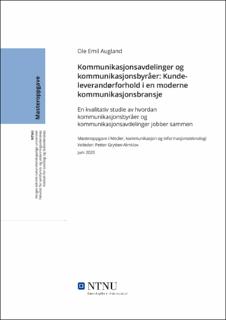| dc.contributor.advisor | Almklov, Petter Grytten | |
| dc.contributor.author | Augland, Ole Emil | |
| dc.date.accessioned | 2021-09-28T17:31:57Z | |
| dc.date.available | 2021-09-28T17:31:57Z | |
| dc.date.issued | 2020 | |
| dc.identifier | no.ntnu:inspera:56553943:38199701 | |
| dc.identifier.uri | https://hdl.handle.net/11250/2784496 | |
| dc.description.abstract | Kommunikasjonsbransjen i Norge har de siste 20 årene gjennomgått en stor oppgang i antall arbeidstakere som arbeider med kommunikasjon i organisasjoner. I kommunikasjonsbransjen er det et skille mellom organisasjoners kommunikasjonsavdelinger og kommunikasjonsbyråer som leverer kommunikasjonstjenester til organisasjoner. Målet med denne masteroppgaven er å avdekke hvordan kommunikasjonsavdelinger og kommunikasjonsbyråer jobber med hverandre i dag, og hva som er viktig for at kommunikasjonsbyråer fremdeles skal være en ettertraktet ressurs for kunder i fremtiden. Ved hjelp av kvalitative dybdeintervjuer kommer studien frem til at kommunikasjonsavdelinger benytter seg av byråer for deres ekspertkompetanse, kreative blikk fra utsiden og av kapasitetshensyn. Begge parter ønsker å jobbe sammen i langvarige kunderelasjoner som bygger tillit mellom partene, og vanlige bestillinger er større kampanjer, produksjon av innhold og annonsering på ulike flater. Selv om byråene helst ønsker å ha kontakt med ledelsen til kundene, har byråene og kommunikasjonsavdelingene en høy grad av samarbeid og samskaping i innledende fase av samarbeidet. I denne fasen er informasjonsutveksling og en tydelig brief sentral for at det skal bli et bra samarbeid. Graden av samarbeid og samskaping synker betraktelig når prosessen beveger seg over i produksjonsfasen. Kommunikasjonsavdelinger deltakelse i denne fasen er forstyrrende for byråene og dermed ikke ønskelig fra deres side. Det største irritasjonsmomentet for kunder som jobber med byråer er når byråer ikke er dyktige nok på å sette seg inn i helheten til kundens merkevare, overordnet kommunikasjonsstrategi og business. Dette ligger til grunn for mange av kunders negative opplevelser med å jobbe med byråer. En konsekvens av blant annet dette er at kommunikasjonsavdelinger i dag gjør det meste av arbeidet med tekst selv. Med en økt kompetanse internt og mindre budsjetter er det også trolig at bruken av byråer blir mindre for organisasjoner i fremtiden. For at kommunikasjonsbyråer også videre skal være en ettertraktet ressurs for kunder er det viktig at byråer i større grad vektlegger å få en forståelse for kundens merkevare, overordnede kommunikasjonsstrategi og business. Byråer må også fokusere på å ha en spisskompetanse, produsere billigere og følge med på eventuelle trender som vil påvirke samfunnet og kommunikasjonsfaget. | |
| dc.description.abstract | The communication industry in Norway has undergone a large increase in the number of employees working with communications in organizations over the past 20 years. In the communications industry, there is a distinction between organizations' communication departments and communication agencies that provide communication services to organizations. The goal of this master's thesis is to uncover how communications departments and communications agencies work with each other today, and what is important for communications agencies to remain a sought-after resource for customers in the future. Using qualitative in-depth interviews, the study finds that communications departments use agencies for their expertise, creative outlook and because of capacity considerations. Both parties want to work together in long-term customer relationships that build trust between the parties, and regular orders are larger campaigns, content production and advertising on different platforms. Although the agencies prefer to have contact with the management of the customers, the agencies and communication departments have a high degree of collaboration and cooperation in the initial phase of the work process. In this phase, information exchange and a clear brief are essential to ensure good collaboration. The degree of collaboration and cooperation decreases significantly as the work process moves into the production phase. Communication departments participation in this phase is disruptive to the agencies and thus not desirable on their part. The biggest annoyance for clients working with agencies is when agencies are not skilled enough to understand the overall brand of the customer, overall communication strategy and business. This is the basis for many of the customers' negative experiences of working with agencies. One consequence of this, among other things, is that communication departments today do most of the work on text themselves. With increased internal competence and smaller budgets, it is also likely that the use of communication agencies will decrease for organizations in the future. In order for communication agencies to continue to be a sought-after resource for customers, it is important that agencies place greater emphasis on understanding the customer's brand, overall communication strategy and business. Agencies must also focus on having a cutting-edge expertise, producing less costly and keeping up with any trends that will affect society and the communications profession. | |
| dc.language | | |
| dc.publisher | NTNU | |
| dc.title | Kommunikasjonsavdelinger og kommunikasjonsbyråer: Kunde-leverandørforhold i en moderne kommunikasjonsbransje | |
| dc.type | Master thesis | |
